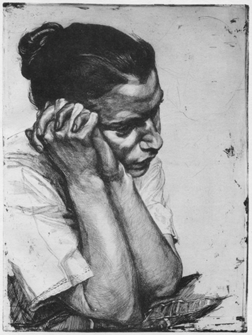As anyone that has sung in a ward choir I’ve directed knows, I love a good praise song. I find exuberant harmony, declarations of God’s goodness, and a joyful “Hallelujah” irresistible. I may have even had the primary children hold neon scarves and shake musical instruments while we paraded around the primary room singing “Praise to the Man” when I was the primary music leader.
For most of my life, when I have turned to the Psalms, I have gone to them for their joy and gratitude that have inspired so many composers throughout the centuries. I still do. But as I have gotten older and seen more of the world, I’ve realized the Psalms offer so much more.

“Girl Praying” by Heinrich Seufferheld. 1893.
To me, the Psalms offer a model for what it means to have a whole-hearted relationship with God – not just the pretty bits of our soul that we feel proud of, but truly bringing our entire flawed, complicated soul as an offering to him. The Psalmists rejoiced and grieved, recognized their personal strengths and weaknesses, sat inside peace and rage, expressed deep connection and deep loneliness, and pleaded in desperation and desolation. And although this range of emotion may not be the stuff of colorful scarves and tambourines, I still sing praises to a God that walks beside us through the messy and imperfect reality of our lives.
Chieko Okazaki, former member of the Relief Society General Presidency, modeled and encouraged this kind of authentic and deeply meaningful relationship with the Lord throughout her life and ministry. Her teachings on honest prayers transformed the way I talked to God and deepened my connection with Him.
Okazaki talks about how at times, we feel the need to churn out “nice prayers” to Heavenly Father – the polite formula of “we thank thee for the gospel, we ask thee to bless the missionaries . . . ” There is immense power in declarations of gratitude, yet sometimes our pain washes over us, and we need different words. Even our Savior used words of mourning from the Psalms on the cross when he declared, “My God, my God, why hast Thou forsaken me?”[1]. We face real sorrow in our lives, and God does not want us to wait to connect with him until we have shoved those feelings down. He wants us to bring them to Him and be made whole.
Okazaki encourages us to allow our prayers to become something even more powerful by offering greater emotional depth and breadth. She teaches, referencing “polite prayers,”
“But who are we trying to kid? Jesus … heard what you muttered when you picked up that one sock, just as you’ve been doing for the past eight years. He caught that worry about the dentist bill that flashed across your mind when you were putting toothpaste on your brush. He doesn’t want polite platitudes. He wants you! All of you! He wants to be the center of your total life – the worried you, the mad you, and the sad you as well as the inspired, happy, obedient, loving you” [2].
Because, after all, who better understands the ugly bits of our life experience better than the one who descended below it all to redeem us? As Okazaki so beautifully explained,
“He understands your mother-pain when your five-year-old leaves for kindergarten, when a bully picks on your fifth-grader, when your daughter calls to say that the new baby has Down’s syndrome. He knows your mother-rage when a trusted babysitter sexually abuses your two-year-old, when someone gives your thirteen-year-old drugs, when someone seduces your seventeen-year-old. He knows the pain you live with when you come home to a quiet apartment where the only children who ever come are visitors, when you hear your former husband and his new wife were sealed in the temple last week, when your fiftieth wedding anniversary rolls around and your husband has been dead for two years. He knows all that. He’s been there. He’s been lower than all that” [3].
Not only has Christ felt all the ugly parts of our humanity, but he has felt them and loves us more deeply than anyone else could. As the psalmist of section 139 expressed,
Lord, You have searched me and known me.
You know when I sit down and when I get up;
You understand my thought from far away.
You scrutinize my path and my lying down,
And are acquainted with all my ways.
Even before there is a word on my tongue,
Behold, Lord, You know it all.
You have encircled me behind and in front,
And placed Your hand upon me.
Such knowledge is too wonderful for me;
It is too high, I cannot comprehend it [4].
It truly is a wonderful thing that God sees us more authentically than anyone else could, and loves us more deeply for it. And I want to return that authenticity – to bring the depth of my soul when I converse with Him and invite that love into my life.
I’ve experienced the fact that when I’m feeling pain or confusion, especially pain or confusion that I am not proud of, I can face these so much more effectively when I pray humbly with my entire soul, a soul that is capable of so much beauty and ugliness, joy and despair, faith and doubt. God doesn’t want me to wait to approach Him until I am what I wish I was — He wants to heal me when I reach out to Him in my brokenness. And I love that the emotional diversity of the Psalms demonstrate how powerful this whole-hearted relationship with God can be.
[1] Psalm 22:1, King James Version
[2] Okazaki, Chieko, Lighten Up! Page 183
[3] Okazaki, Chieko. Lighten Up! Page 175
[4] Psalm 139:1-6, New American Standard Bible (used for clarity in archaic terms)
